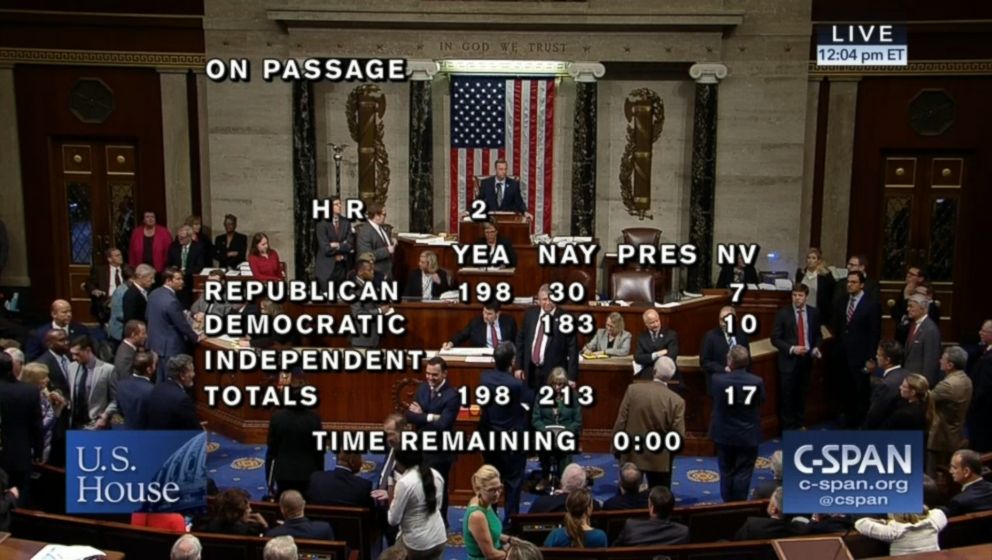Farm bill fails in the House after conservatives buck GOP leaders
The House Freedom Caucus helped crash the measure.
House Republicans and President Donald Trump are licking their wounds following a surprising turn of events with the defeat of the farm bill this afternoon, delivering a stinging loss to House Speaker Paul Ryan, R-Wis., as he failed to fend off a rebellion from the conservative flank of his conference.
Just 198 Republicans voted in favor of the farm bill, failing to send a GOP marker to the Senate as Congress works to reform nutritional and agricultural programs.
Thirty Republicans, many from the House Freedom Caucus, joined 183 Democrats to defeat the bill.
“President Donald J. Trump is disappointed in the result of today’s vote in the House of Representatives on the Farm bill, and hopes the House can resolve any remaining issues in order to achieve strong work requirements and support our Nation’s agricultural community,” Lindsay Walters, White House deputy press secretary, wrote in a statement. “The Administration underscores the need to bring certainty to our farmers and ranchers and to the many Americans receiving food assistance, and will continue to work with Congress to pass a Farm bill on time."
Chief Deputy Whip Rep. Patrick McHenry told reporters that GOP leadership expected sufficient support for the bill prior to the vote, but blamed conservatives who reneged on a deal to vote on immigration reform prior to June 25 in exchange for their support on the farm bill.
“We had enough members that were willing to vote for the farm bill, that like the farm bill, but a small group that wanted to extract some direct pledge on immigration that we could not simply fulfil under their timeframe, which is really a great disappointment that they would vote against a policy that they professed to support in order to get something immediate that was not in our legislative capacity,” McHenry, R-North Carolina, said.
Throughout the week, members of the House Freedom Caucus had pressured GOP leaders to schedule a vote on the Goodlatte bill, “Securing America’s Future Act.”
“You’re asked to put up a vote now for a promise in the future that is somewhat vague, and unfortunately too many of our members have been left standing at the altar,” Pennsylvania Republican Rep. Scott Perry, a member of the Freedom Caucus, told reporters. “It’s all about timing unfortunately, and leverage, and I think the farm bill was a casualty.”
McHenry told reporters he is worried the farm bill’s defeat will inspire more Republicans – within “probably hours” – to sign onto a discharge petition to force a free-wheeling debate on immigration reform next month.
“I think Republicans in the majority need to resolve our vote on immigration, or a series of votes, and come to terms with that. We should not allow the Democrats to utilize the floor to hijack this process,” he said. “What I’m interested in is putting an immigration bill that the president supports and that we can pass on the House floor. I don’t think Goodlatte is going to be the product that can pass the floor.”
California Rep. Jeff Denham, a moderate Republican who is leading the effort to gather signatures on the discharge petition, said Republicans will regroup this afternoon with Ryan and other GOP leaders.
“We are continuing to add more signatures,” Denham said. “I would say given the breaking of the agreement that was made today, you’re going to see more Republicans that are frustrated and angry enough to sign onto something that they’ve never signed onto before.”
The effort currently stands at 196 signatures, just 22 votes short of the 218 signatures required.
Asked if he believes conservatives were motivated by a desire to embarrass House leadership, McHenry said it comes with the job.
“The fact is if you’re in House leadership in either party, embarrassment is just certainly part of the process," he said.
Asked if he personally felt embarrassed, McHenry quipped, “I wear a bowtie. I’m comfortable.”
When the vote was called, Democrats erupted in cheers, taunting Republicans.
Democrats united to oppose the farm bill, contending that the measure cuts $23 billion from the supplemental nutritional assistance program, the food stamp program also known as SNAP that provides an average of $125 per month to more than 42 million Americans.
House Minority Leader Nancy Pelosi, D-Calif., told reporters Republicans should scrap the bill and work with Democrats toward a bipartisan solution.
“We have done this before in a bipartisan way. We can do that again,” she said.

Rep. Collin Peterson, the ranking Democrat on the House Agriculture committee, predicted that today’s failed vote will make any subsequent attempt to enact a farm bill more of a challenge – especially if the issue drags on into the next session of Congress.
“It’s going to make it harder, if we don’t get it done this year, this will make it harder for whoever’s in charge next time to get it done,” Peterson, D-Minn., said. “We didn’t need to be in this position. We could have delivered plenty of Democrats to pass this bill.”
One primary element drawing Democratic opposition was changes to work requirements. The bill mandated adult beneficiaries must spend 20 hours each week working or participating in a state-run training program.
According to the Congressional Budget Office, even without changes, current policy is forecast to result in a $10 billion reduction in SNAP benefits over the next decade due to economic growth, which Republicans believe will help lift many beneficiaries out of the program.
Under the House bill, Republicans predicted as more people head back to work, many individuals would leave the program because they would no longer need the resources -- reducing spending by roughly $20 billion over the next decade, according to a senior House Agriculture committee aide.
Republicans contended the SNAP title is budget neutral, and any savings from changes in the program are reinvested in SNAP and other nutrition assistance programs.
The Senate has not released its own legislative text yet, but is expected to move a farm bill later this summer. If the Senate successfully passes its own measure, and the House is able to pass its own version some day, the two versions would need to be reconciled at a bicameral conference committee and approved again by both chambers in order to reach the president’s desk for signature.
ABC News’ Ben Siegel contributed to this report.




